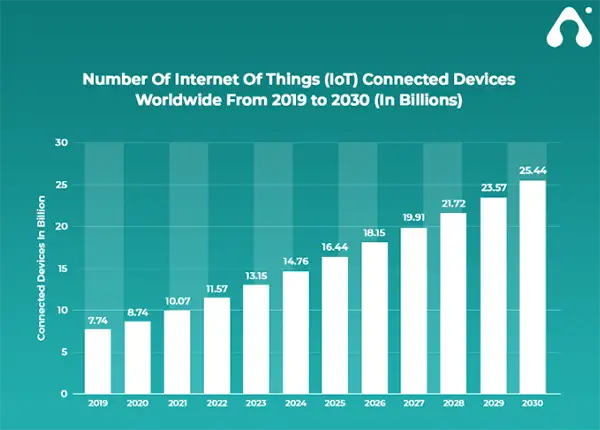The Internet of Things has changed the way we interact with the outside world. By connecting devices, appliances, wearables, and everyday objects over the internet, it has enabled greater connectivity and real-time communication.
In this article, we will explore what IoT is, its foundations, the future it holds for users and investors, and the challenges and concerns related to its integration into our lives.
It is a network of electronic devices, sensors, appliances, and software that are all connected in real-time over the net. The network can include mobile apps, wearable tech, home appliances, heavy industrial machinery, vehicles, and almost everything one might want to connect.
The Internet of Things enables data sharing and communication even without human contact. This is made possible through a connectivity infrastructure built on electronic circuits, routers, Wi-Fi or Bluetooth, sensors, embedded microprocessors, FPGAs, clocks, filters, power regulators, and many other tiny electrical components.
From manufacturing to medical sectors to daily life routines, the Internet of Things (IoT) is revolutionizing the world across various industries.
Do You Know – It is estimated that by 2025 IoT devices will be responsible for generating around 73 zettabytes of data
It adds convenience and efficiency to day-to-day life by enabling homeowners to automate and manage their homes. This concept is also known as a Smart Home, where AI, connectivity software, devices, and sensors connect to help you wield contactless control over home lighting, heating, and security systems, making your day-to-day life easier and enjoyable.
It helps optimize manufacturing processes by monitoring and connecting inventory for streamlined supply chain management. Through IoT, production is optimized in every sector, from agriculture to logistics and retail.
For instance, in the realm of transportation, it has enabled riding on autonomous vehicles, ensuring greater safety and efficiency. Similarly, it has brought the concept of smart grids to power generation. Smart grids enable a two-way flow of information between electricity consumers and the generation unit, while also regulating production on multiple sites to optimize the grid’s performance.
Precision agriculture maximizes crop yield while optimizing water usage and fertilizer application, and has been enabled with its help. Through IoT, it can be regulated when and how many nutrients are ingrained in crops to ensure the best timing for maximum growth.
IoT has truly revolutionized healthcare provision for both caretakers and patients. Through it, healthcare professionals can monitor the health conditions of their patients remotely and integrate data from medical records, family history, and the outputs of wearables. In fact, it has led to the growth of the telemedicine industry.
Besides, through the Internet of Things, optimal conditions such as controlled temperature, heat, and sound can be produced to take care of sensitive patients.

The future of IoT is very promising as breathtaking advancements are happening, and in the newer phase, there is potential to also link Artificial Intelligence at a greater pace with IoT devices.
It is likely to become more integrated in every sector. For example, in agriculture, there is potential to incorporate it in irrigation systems as well. Meanwhile, in urban planning and public service provision, it can yield immense benefits for users by integrating data from road cameras, existing databases, and user’s feedback for effective planning.
Here are some of the ways IoT will continue to thrive in the coming years and even decades:
Absolutely! Investment in IoT is worth it for various reasons.
First, if you are a business operating in the manufacturing or services sector, integrating it into your operations and productions can help you reduce costs.
It can help you make quick and better decisions by enabling you to analyze large sets of data from various sources. Moreover, it can streamline supply chain operations for enhanced production and management.
Further, it can enable you to adapt to the changing needs of society in this information age. Through it, you can bring innovation to your products and designs while meeting all the needs and wishes of end-consumers.
Though there are potential benefits associated with investing in IoT and integrating it into your operations, there are also some concerns that you must be aware of.
Also Read:- Why Does Internet Privacy Matter
The future is here! The way we interact with the physical world around us is going to change as we connect with it more. It has already been introduced in various fields of life, and moving forward, its integration is only going to increase.
If you are a business that is looking to invest in IoT, you must know that its promises across various sectors are immense. Incorporating it would not only help you achieve your entrepreneurial dreams but will also bring efficiency, productivity, and sustainability in a well-connected world!
